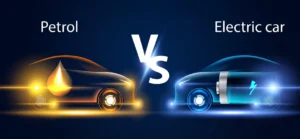Understanding Electric and Hybrid Vehicles
Before diving into the comparison, let’s define these two vehicle types: Electric vs. Hybrid: Which One Suits Your Needs? 2025
- Electric Vehicles (EVs): Fully powered by electricity, EVs run on rechargeable batteries and require charging stations.
- Hybrid Vehicles: Use both a gasoline engine and an electric motor, switching between the two for efficiency and reduced emissions.

Electric vs. Hybrid: Which One Suits Your Needs? 2025
Each type of vehicle has unique advantages, making them suitable for different driving needs. Electric vs. Hybrid: Which One Suits Your Needs? 2025
The Benefits of Electric Vehicles
- Zero Emissions – EVs produce no tailpipe emissions, making them an eco-friendly choice. Electric vs. Hybrid: Which One Suits Your Needs? 2025
- Lower Operating Costs – Electricity is generally cheaper than gasoline, and maintenance costs are lower due to fewer moving parts. Electric vs. Hybrid: Which One Suits Your Needs? 2025
- Government Incentives – Many regions offer tax credits and rebates for purchasing an EV.
- Quiet and Smooth Drive – EVs operate quietly and provide instant torque for a seamless driving experience.
- Home Charging Convenience – You can charge your EV overnight at home, avoiding frequent trips to the gas station.
Potential Drawbacks of EVs
- Limited Range – Many EVs have a range of 200-300 miles per charge, which may not be sufficient for long trips. Electric vs. Hybrid: Which One Suits Your Needs? 2025
- Charging Infrastructure – Although improving, charging stations are not as widespread as gas stations.
- Higher Upfront Costs – EVs tend to have a higher initial price, though savings on fuel and maintenance can offset this.
The Benefits of Hybrid Vehicles
- Better Fuel Efficiency – Hybrids combine gasoline and electric power, resulting in improved mileage. Electric vs. Hybrid: Which One.
- Lower Emissions than Traditional Cars – While not zero-emission, hybrids produce less pollution than conventional gas-powered vehicles.
- No Range Anxiety – Since hybrids can switch to gasoline, you don’t have to worry about running out of battery power.
- More Affordable Than EVs – Hybrid cars typically cost less than fully electric vehicles.
- Regenerative Braking – Converts energy lost during braking into electricity, enhancing efficiency.
Potential Drawbacks of Hybrids
- Still Depend on Gasoline – Unlike EVs, hybrids still emit carbon emissions.
- Higher Maintenance Costs than EVs – While lower than conventional vehicles, hybrids still have engines and other components that require servicing.
- Less Environmental Impact than EVs – While cleaner than traditional cars, hybrids don’t eliminate emissions entirely.
Which One Suits Your Needs?
Your choice between an EV and a hybrid depends on several factors:
Driving Habits
- If you drive short distances or have access to charging stations, an EV is a great choice.
- If you frequently take long trips, a hybrid may be more convenient.
Budget
- If you’re looking for long-term savings and are willing to pay a higher upfront cost, an EV is the way to go.
- If you need an affordable initial investment, a hybrid makes more sense.
Environmental Impact
- For zero emissions, an EV is the best option.
- If you want to reduce emissions but still need gasoline reliability, a hybrid is a compromise.
Conclusion: Making the Right Choice
Both electric and hybrid vehicles offer excellent benefits, but the best choice depends on your lifestyle, budget, and environmental goals. If you’re ready to make the switch, consider researching models, checking for government incentives, and exploring charging options in your area. Electric vs. Hybrid: Which One Suits Your Needs? 2025

Electric vs. Hybrid: Which One Suits Your Needs? 2025
Ready to make a decision? Explore electric and hybrid models at your local dealership today and take the first step toward a greener future! Electric vs. Hybrid: Which One Suits Your Needs? 2025